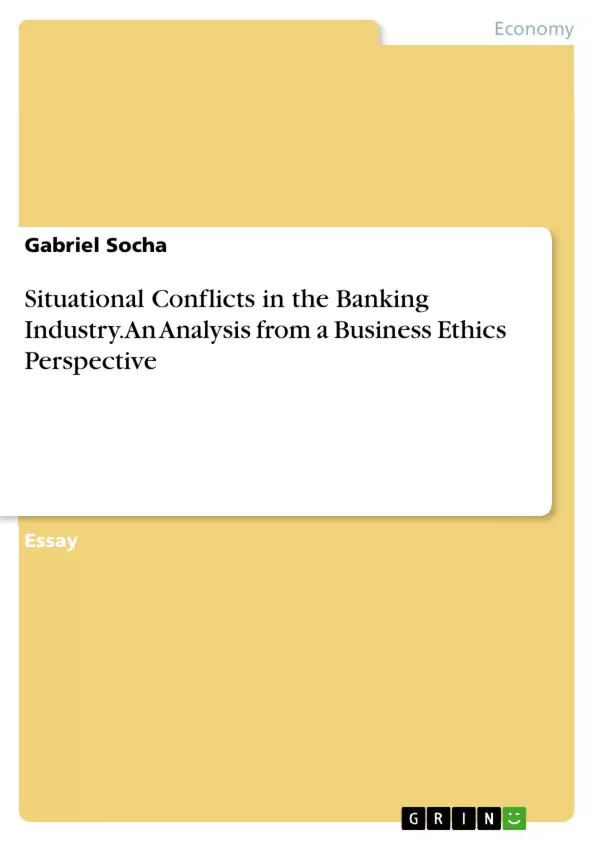This paper aims to clarify ethical dilemmas within the financial sector according to the concept of moral discernment. To achieve the goal of this paper, two ethical theories, namely deontology and utilitarianism, are briefly explained. Then, two banking industry-specific situational ethical conflicts are illustrated. The first conflict, mis-selling of financial products, is analyzed by the concept of deontology. The second conflict, the use of artificial intelligence in credit scoring is analyzed from a utilitarianism perspective. Additionally, various ethical concepts are introduced to give practical measures on how firms can cope with these situational conflicts.
Todays’ business world is often characterized by “VUCA” – volatility, uncertainty, complexity, and ambiguity. In such a world, managers are faced with constantly changing challenges that can lead to ethical conflicts within business environments. Therefore, more than ever before, guidelines are needed to prevent business behavior that destroys relationships between stakeholders. As the internet and in particular social media increase transparency, ethical behavior within companies is of significant priority to build and hold relationships that are both profitable and sustainable.
At least since the global economic crisis in 2008, the banking industry is in strong criticism due to unethical and partially illegal actions. Even though this strong criticism created high pressure on regulators and banks to prevent these business practices, banking scandals do not seem to subside. Thus, it cannot be denied that the banking industry has problems dealing with moral conflicts.
Inhaltsverzeichnis (Table of Contents)
- Introduction
- Ethical concepts
- Deontology
- Utilitarianism
- Conflicts in the Banking Industry
- Mis-selling of Financial Products
- Artificial Intelligence in the Credit Scoring Process
- Critical Discussion and Conclusion
Zielsetzung und Themenschwerpunkte (Objectives and Key Themes)
This paper aims to explore ethical dilemmas within the financial sector through the lens of moral discernment, defined as the ability to evaluate actions ethically considering their consequences and preconditions. The paper utilizes two ethical theories, deontology and utilitarianism, to analyze two specific situations in the banking industry: the mis-selling of financial products and the use of artificial intelligence in credit scoring.
- Ethical dilemmas within the financial sector
- Moral discernment as a framework for ethical analysis
- Application of deontology and utilitarianism to real-world banking scenarios
- Analysis of ethical challenges posed by AI in the banking industry
- Practical measures for firms to address situational ethical conflicts
Zusammenfassung der Kapitel (Chapter Summaries)
The paper begins by introducing two key ethical theories: deontology and utilitarianism. Deontology emphasizes the adherence to rules and principles, regardless of the outcome, while utilitarianism focuses on maximizing overall good through consequences. The paper then examines two situational ethical conflicts within the banking industry, analyzing the mis-selling of financial products through the framework of deontology and the use of artificial intelligence in credit scoring from a utilitarian perspective.
Schlüsselwörter (Keywords)
The key terms and concepts explored in this paper include business ethics, moral discernment, deontology, utilitarianism, mis-selling of financial products, artificial intelligence, credit scoring, ethical dilemmas, and ethical decision-making within the banking industry.
Frequently Asked Questions
What is "moral discernment" in business ethics?
It is the ability to ethically evaluate actions by considering their preconditions and consequences, helping managers navigate complex dilemmas.
How does deontology apply to mis-selling in banking?
Deontology focuses on rules and duties; mis-selling is viewed as unethical because it violates the fundamental duty of honesty toward the customer, regardless of profit.
What are the ethical concerns of AI in credit scoring?
From a utilitarian perspective, the use of AI must maximize overall good; concerns arise if AI leads to unfair bias or lacks transparency for the stakeholders.
What does "VUCA" stand for in the business world?
VUCA stands for Volatility, Uncertainty, Complexity, and Ambiguity, describing the challenging environment of modern management.
Why is ethics a priority for banks since the 2008 crisis?
Increased transparency through social media and a history of scandals have made ethical behavior vital for building sustainable and profitable stakeholder relationships.
- Citar trabajo
- Gabriel Socha (Autor), 2019, Situational Conflicts in the Banking Industry. An Analysis from a Business Ethics Perspective, Múnich, GRIN Verlag, https://www.grin.com/document/490852



